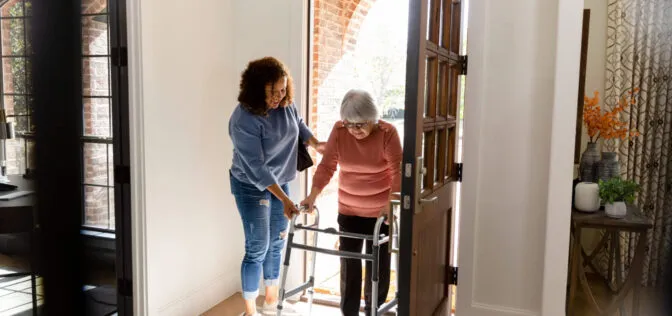Care Homes
Care homes, also known as residential care facilities or Board and Care Homes, are specialized facilities that provide round-the-clock care and support for seniors. Typically, these are small residences in suburban neighborhoods, with only a handful of residents in the home.
What is a Care Home and What Does It Mean for Seniors?
Each Care Home might specialize in some kind of senior living care need, like assisted living or memory care. The caregiver-to-patient ratio is the highest of any senior living option except In-home care.
With the aging population and the increasing prevalence of chronic health conditions, the demand for care homes has been growing in recent years. Care homes offer a safe and supportive environment for seniors who require ongoing care and attention. They provide peace of mind to families who may not be able to provide full-time care themselves. On this page, we will explore what care homes are, their benefits, and how to choose the right care home for your loved one.

The Importance of Finding the Right Care Home for Seniors
Finding the right care home for seniors who need round-the-clock care and support is crucial for their physical, emotional, and mental well-being. Care homes provide a wide range of services and amenities, from basic medical care to specialized services like dementia care, and it is important to choose a care home that can meet the specific needs of your loved one. In addition, care homes are not all the same, and the quality of care and the experience of the staff can vary significantly between facilities.
Choosing the right care home can ensure that your loved one receives the highest quality of care and support, while also providing peace of mind for you and your family. Therefore, it is important to work with a senior living advisor in the city you prefer. They will know all of the reputable care homes and be able to share research, and costs, and even help set up tours so you can assess their quality of care and suitability for your loved one’s needs.

Finding the Best Senior Living is Complicated. We've Made It Easier With Our Free Care Assessment Tool. Try It.
Care homes, also known as Board and Care Homes or residential care homes, are specialized senior living properties that provide 24/7 care and support for seniors. Care homes are small, residential settings designed for seniors who have complex medical needs and require round-the-clock care, including those who have chronic health conditions, disabilities, or cognitive impairments like dementia.
Independent living communities are an option for seniors who want to live independently but within a community of other seniors. These communities may provide services such as transportation, housekeeping, and social activities.
Assisted living facilities are designed for seniors who need help with activities of daily living (ADLs) such as bathing, dressing, and managing medication. In these facilities, seniors typically have their own room or apartment and can participate in social activities and receive medical care on-site.
Memory care facilities are specialized communities that cater to seniors with Alzheimer’s or other forms of dementia. They offer a secure environment and specialized care to help seniors with memory loss maintain independence and dignity.
Continuing care retirement communities offer different levels of care to seniors as their needs change over time. These communities usually have independent living, assisted living, and skilled nursing care all on one campus.
Nursing homes are designed for seniors who require round-the-clock medical care and assistance with daily living activities. These facilities typically offer skilled nursing care, rehabilitation services, and other medical support.
Choosing a care home for seniors can offer a range of benefits for both the seniors and their families. Here are some of the main advantages of choosing a care home:
- 24/7 care and support: Care homes provide round-the-clock care and support to seniors who require assistance with activities of daily living, medical needs, and social support. This ensures that seniors always have access to the care they need, regardless of the time of day.
- Personalized care plans: Care homes develop personalized care plans for each resident based on their individual needs and preferences. This means that seniors receive tailored care and support that meets their specific requirements, promoting better health outcomes and quality of life.
- Social activities and events: Care homes offer a range of social activities and events, including games, crafts, music, and outings, to help seniors stay engaged and active. This can help reduce feelings of loneliness and isolation and promote socialization and interaction with others.
Safety and security: Care homes provide a safe and secure environment for seniors, with staff on hand to monitor and respond to any emergencies or issues that may arise. - Respite for caregivers: For families and caregivers of seniors, care homes can provide a much-needed respite from the demands of caring for a loved one. This can help reduce stress and burnout and provide time for caregivers to focus on their own needs and well-being.
- Access to medical care: Care homes often have licensed healthcare professionals on staff who can provide medical care, including administering medication, monitoring vital signs, and coordinating medical appointments. This ensures that seniors have access to the medical care they need to maintain their health and well-being.
Some care homes offer specialized services or amenities to meet the specific needs of certain groups of residents. Here are some examples of specialized care offered in some care homes:
- Dementia care: Care homes may offer specialized care for residents with dementia or other cognitive impairments. This can include specially trained staff, memory care programs, and specialized living spaces designed to promote safety and comfort for residents with dementia.
- End-of-life care: Some care homes provide end-of-life care for residents who are in the terminal stages of illness. This can include palliative care and hospice care, as well as support for families during this difficult time.
- Palliative care: Care homes may offer palliative care for residents with serious illnesses or chronic conditions. This type of care focuses on managing pain and other symptoms, as well as providing emotional and spiritual support for residents and their families.
- Respite care: Care homes may offer respite care for families or caregivers who need a break from caring for their loved ones. This can provide temporary care and support for seniors while their families take a break or go on vacation.
- Rehabilitation services: Some care homes offer rehabilitation services, such as physical therapy, occupational therapy, and speech therapy, to help residents regain their independence and mobility after an illness or injury.
- Specialized amenities: Some care homes offer specialized amenities to meet the unique needs and preferences of residents, such as outdoor gardens, pet therapy, music therapy, or specialized dining options.
Choosing the right senior living community for a loved one can be a difficult decision. Here are some factors to consider when determining whether a care home is the right senior living option for a loved one:
- Guidance from a Senior Living Expert: Be sure to connect with a local senior living advisor who will know all the details on the most reputable care homes.
- Care Needs Assessment: It’s advisable to complete online care needs assessment to determine what kind of care home is ideal for your loved one. Also, by using this free tool, your local advisor will have more details to help you in your search.
- Health and Care Needs: Know the health and care needs of your loved one. If they require assistance with activities of daily living, medical care, or social support, a care home may be a good option.
- Safety and Security: Consider the safety and security measures in place at the care home. Are there staff on hand 24/7 to respond to emergencies? Are there safety features in place, such as handrails, grab bars, and call buttons?
- Location and Accessibility: Consider the location of the care home and whether it is accessible to family and friends. Is it close to medical facilities, shopping, and other amenities? Is it easy to visit and stay in touch with your loved one?
- Staffing and Quality of Care: Research the care home’s staff-to-resident ratio and the qualifications and training of the staff. Is there a nurse on staff? Are the staff friendly and caring? Do they treat residents with respect and dignity?
- Social Activities and Events: Consider the social activities and events offered at the care home. Are there opportunities for residents to socialize and participate in activities they enjoy?
- Cost and Financial Considerations: Consider the cost of care and whether it is affordable for your loved one and their family. Are there any financial assistance programs or insurance plans that can help cover the cost of care? Often, Care Homes are the most affordable option without sacrificing quality care.
- Reputation and Reviews: Research the care home’s reputation and read reviews from current and former residents and their families. This can give you a better sense of the quality of care and services provided at the care home.
While board and care homes can be an excellent option for some seniors, they may not be suitable for everyone. Here are some types of seniors who may benefit from a care home, as well as those who may not:
Seniors who may benefit from a care home:
- Seniors who require assistance with activities of daily living, such as bathing, dressing, and grooming.
- Seniors who have complex medical needs that require monitoring and care from a trained medical professional.
- Seniors may be prone to falls or have mobility issues that make it difficult to live independently.
- Seniors who may be at risk of social isolation or loneliness, and could benefit from regular socialization with other residents and staff members.
- Seniors who may have dementia or other cognitive impairments that require specialized care and support.
Seniors who may not benefit from a care home:
- Seniors who are still able to live independently and do not require assistance with activities of daily living.
- Seniors who prefer to live in their own homes or with family members, and are not interested in the social activities and events offered at a care home.
- Seniors who have a strong support network of family and friends who are able to provide the necessary care and support.
- Seniors who have specific cultural or religious needs that may not be met in a care home setting.
Choosing the right residential care home for a loved one can be a daunting task, but with careful research and consideration, you can make an informed decision. Here are some tips to help you choose the right care home for your loved one:
- Use a Care Assessment Tool: This is a free, online tool to help you organize all of the aspects of a senior living search and provide guidance on the best options in your search area.
- Work with a Senior Living Advisor: Find a local senior living expert who is certified and will not charge you for their services. The best ones know all of the senior living communities in the city you are searching. They will work with your results from the care assessment tool to find the best options.
- Identify your loved one’s needs: Determine your loved one’s health and care needs, including any medical conditions, mobility issues, or cognitive impairments. This will help you find a care home that can provide the appropriate level of care and support.
- Research your options: Ask your senior living advisor to give you a list of care homes in your area. In addition, they can provide you with information on their services, amenities, and reputation. Visit potential care homes: Have your senior living advisor schedule a visit to the care homes you are considering. Take note of the overall cleanliness, safety features, and staff-to-resident ratio. Speak with the staff and ask questions about their qualifications, training, and experience.
- Consider the location: Choose a care home that is conveniently located for family and friends to visit. Consider the proximity to medical facilities, shopping, and other amenities.
- Check for specialized care services: If your loved one requires specialized care, such as dementia care or end-of-life care, make sure your senior living advisor can validate the care home can provide these services.
- Review the costs: Work with your senior living advisor to determine the costs of care and whether it is affordable for your loved one and their family. Your senior living advisor will help you look for any financial assistance programs or insurance plans that can help cover the cost of care.
- Review the contract: Before making a final decision, review the care home’s contract carefully with your senior living advisor. Make sure you understand the terms and conditions, including any fees, policies, or procedures.
- Get feedback from residents and families: Ask for feedback from current and former residents and their families. This can give you a better sense of the quality of care and services provided at the care home.
Visiting potential care homes in person and asking questions is an essential part of the process of choosing the right care home for your loved one. A local, certified senior living advisor can set up these tours and provide you with a list of questions to ask. Here are some reasons why it is important to do so:
- Assess the quality of care: Visiting a care home in person allows you to assess the quality of care provided firsthand. You can observe how staff interact with residents, the overall cleanliness of the facility, and the quality of meals provided. You can also speak with current residents and their families to get their feedback.
- Evaluate the environment: A care home should provide a safe and comfortable environment for its residents. Visiting in person allows you to assess the safety features of the facility, such as handrails, grab bars, and emergency call systems. You can also evaluate the overall atmosphere of the care home and whether it is a welcoming and supportive environment.
- Ask questions: Visiting a care home allows you to ask questions about the care and services provided. You can ask about the qualifications and experience of staff members, the range of services provided, and any specialized care services offered. You can also ask about policies and procedures, such as visiting hours and medication management.
- Determine compatibility: Visiting a care home in person allows you to determine whether it is a good fit for your loved one’s needs and preferences. You can evaluate the social atmosphere of the facility and whether it aligns with your loved one’s personality and interests.
If you are considering finding and choosing a board and care home for a loved one, here are some steps you can take to begin the process:
- Use a Care Assessment Tool: This free online tool will help you clarify the exact kind of care your loved one needs. It will make personalized recommendations for how to proceed.
- Work with a Senior Living Advisor: These certified professionals live and work in the area you are searching. They will NOT charge for their services to support you. They are compensated by the care home you eventually select.
- Research care homes in the area: With your senior living advisor, research care homes in your area.
- Schedule visits: Once you have identified potential care homes, ask your senior living advisor to schedule visits to each one. This will allow you to see the facility in person, meet staff members, and assess the quality of care provided.
- Assess costs and financial options: Work with your senior living advisor to determine the costs of care and whether it is affordable for your loved one and their family. Ask your senior living advisor about any financial assistance programs or insurance plans that can help cover the cost of care.
- Determine your loved one’s needs: Identify your loved one’s health and care needs, including any medical conditions, mobility issues, or cognitive impairments. This will help you find a care home that can provide the appropriate level of care and support.
- Check for specialized care services: If your loved one requires specialized care, such as dementia care or end-of-life care, make sure the care home can provide these services.
Consider the location: Choose a care home that is conveniently located for family and friends to visit. Consider the proximity to medical facilities, shopping, and other amenities. - Ask questions: When visiting care homes, be sure to ask questions about the care and services provided, the qualifications and experience of staff members, policies and procedures, and any specialized care services offered.
By following these steps, you can begin the process of finding and choosing a senior residential care home that provides your loved one with the care and support they need, in a safe and welcoming environment. It is important to work with a certified professional, so you can take your time and carefully consider your options. Choosing the right care home can have a significant impact on your loved one’s quality of life.
The Services and Amenities Provided in a Care Home
Care homes are not all the same. It’s important to speak to your local senior living advisor to learn the different services and amenities each provides.

Here are some of the options you will find in a residential care home for seniors:
Care homes provide assistance with activities of daily living (ADLs), such as bathing, dressing, grooming, toileting, and eating.
Many care homes have licensed healthcare professionals on staff who provide medical care, including administering medication, monitoring vital signs, and coordinating medical appointments.
Care homes may offer rehabilitation services, such as physical therapy, occupational therapy, and speech therapy, to help residents regain their independence and mobility.
Care homes often have social programs and activities to keep residents engaged and active, such as games, crafts, music, and outings.
Care homes provide nutritious meals and snacks to residents and can accommodate special dietary needs.
Care homes typically provide housekeeping and laundry services to keep residents’ living spaces clean and comfortable.
Care homes provide around-the-clock supervision and security to ensure the safety of residents.
Some care homes provide end-of-life care to residents who are in the terminal stages of illness, including palliative care and hospice care.

Need help urgently? Find the Best Local Care Home Now.
